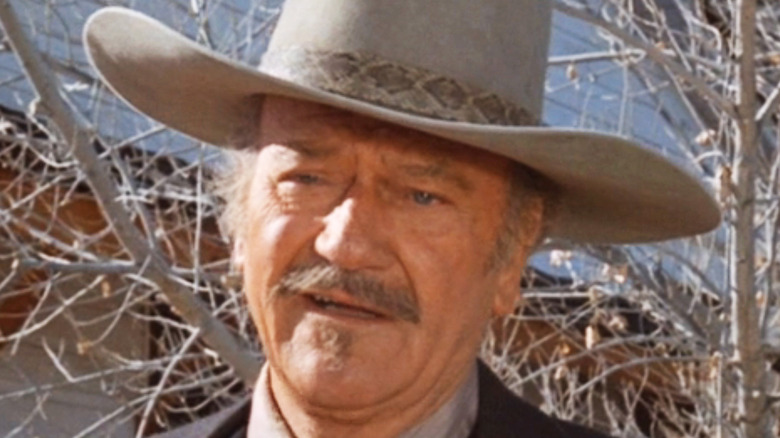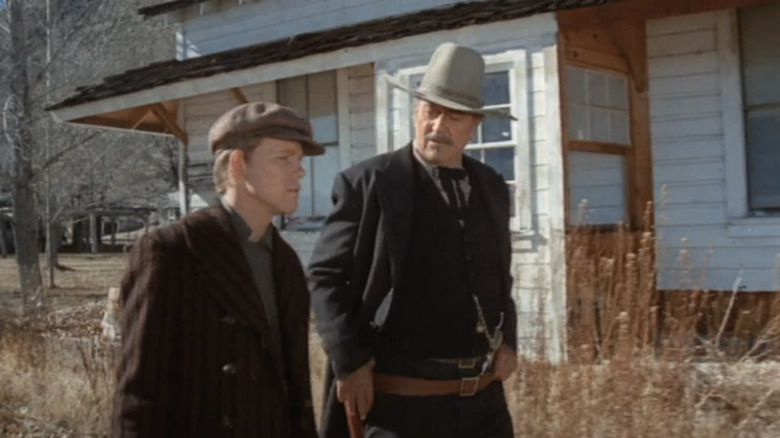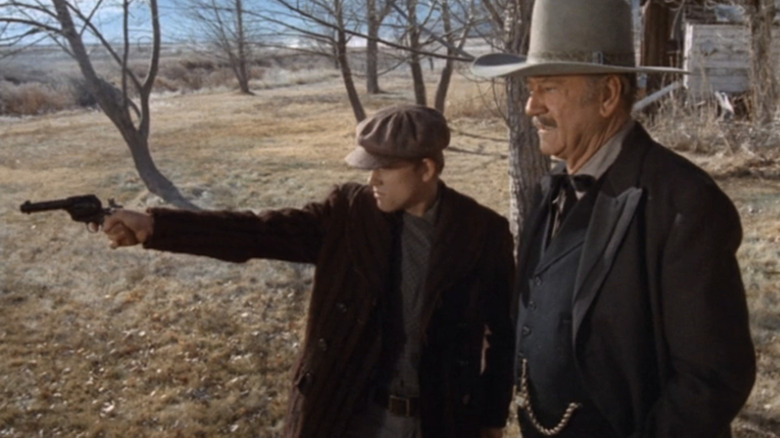
Pairing legendary cinematic tough guy John Wayne with baby-faced former child-star Ron Howard might not seem like the most obvious choice, but the two made a great on-screen duo in 1976's "The Shootist."
Don Siegel's Western — based on Glendon Swarthout's 1975 novel of the same name — saw Wayne play former Sheriff turned gunfighter J. B. Books. The aging outlaw is diagnosed with cancer shortly after arriving in a Nevada town at the tail-end of the old west. He then spends his final days taking a young fatherless boy under his wing in the form of Ron Howard's Gillom Rogers, much to the dismay of the youngster's mother who doesn't want her son following in the footsteps of a well-known killer.
The film functioned as a sort of meta commentary on Wayne's own career and his era of Hollywood, which was also coming to an end — even though Wayne couldn't have known "The Shootist" would be his final film at the time. By the end of the movie, young Gillom seems to reject his mentor's violent ways in a symbolic moment that felt as if Wayne was somehow acknowledging the winding down of his career and the waning popularity of the Western among mass audiences by the mid-70s. Indeed, the Duke would pass away from stomach cancer three years after "The Shootist" debuted, making this his final Western and final film overall.
It's a good thing, then, that Howard had a chance to work with the screen legend before it was too late, especially since Wayne taught Howard a very important lesson during their time together on "The Shootist." But their relationship went beyond their one on-screen collaboration. "The Shootist" — during which Wayne fought a behind-the-scenes battle — debuted to modest box office success and critical acclaim, and the pair remained friends thereafter, to the extent that the Duke actually had a plan for what their next project might be. Sadly, that project was never realized before Wayne passed away.
Read more: The 10 Worst HBO Shows Ever
Ron Howard Could Have Starred Alongside John Wayne One More Time

Long before he starred alongside John Wayne in "The Shootist," Ron Howard made his name as a child star, most notably by playing Opie Taylor on the 1960s TV series "The Andy Griffith Show." After playing a lead role in George Lucas' "American Graffiti" in 1973, Howard boosted his profile even further by playing Richie Cunningham in the sitcom "Happy Days." He debuted on the series in 1974, playing a the nice but boring counterpart to Henry Winkler's Arthur Fonzarelli. The young actor stayed with the hugely-popular series right up until the start of season 8 in 1980 (though he returned as a guest later in the show's run). It was during his time on "Happy Days," then, that Howard first worked with John Wayne, learning how much of an artist the Duke really was on "The Shootist" and seemingly making enough of an impression on the man that he developed plans for another collaboration.
In a 2023 interview with Graham Bensinger, Howard recalled how he ran into Wayne after "The Shootist" had been released. "We crossed paths at an AFI dinner honoring Henry Fonda," he explained. "I saw him and he said, 'I found a book. I want to make it into a movie and it's you and me or it's nobody.'" Howard went on to explain how Wayne's illness and declining health was known at the time, adding "It was really poignant at first to see that he still had that drive, but also to know that he wanted to work together again, which meant a lot to me."
Howard didn't elaborate on the project during this interview, but at the time of his death, the Duke had already bought the rights to Buddy Atkinson's novel "Beau John." The former "Beverly Hillbillies" writer had finished his novel and before it was even published Wayne's production company, Batjac Productions, snapped up the rights. The story revolved around a family in small town Kentucky during the 1920s, and would have seen the Duke playing the patriarch in what was a more lighthearted project that the actor was typically known for. It would also have featured several generations of the family, including a son, son-in-law, and grandson, and Wayne had Howard in mind for one of these roles. In Scott Eyman's book "John Wayne: The Life and Legend," however, Howard is quoted as saying the adaptation "never got past the verbal stage," adding, "At that point, [Wayne] was showing signs of not being well. I was a little doubtful."
Ron Howard Won Over John Wayne Early On

Just how well John Wayne's "Beau John" adaptation would have fared will forever remain a mystery, but at least Ron Howard will always know the Duke had a soft spot for him. Howard discussed his relationship with the late actor during a 2014 Tribeca Film Festival panel (via The Huffington Post) where he explained how things started out a tad rocky on "The Shootist" — which remains one of John Wayne's best films — but he eventually won over the veteran star by asking him to run lines.
According to Howard, Wayne responded to the request by saying, "Nobody ever asks me to do that." From that point on it seemed the two got along, with Howard also claiming that his television background appealed to Wayne. The actor-turned-director told UPI, "It turned out my television background was something he really related to because those Westerns were sort of his version of being a television actor. He felt like with that kind of background, a person would know how to get it done." Whatever the case, Wayne was clearly impressed with his younger counterpart, as evidenced by the fact he planned to make another film with him. Considering "The Shootist" was well-received by critics, however, it might be for the best that this was the duo's one and only collaboration.
If you're looking for the easiest way to keep up with all the major movie and TV news, why not sign up to our free newsletter?
Read the original article on SlashFilm.












